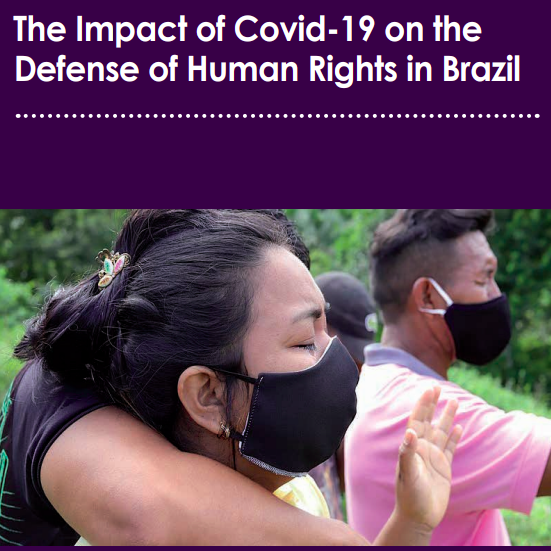The dismantling and attacks on the SUS aggravate the Covid-19 situation in Brazil and have a direct impact on the actions of human rights defenders. – Daniele Duarte, Justiça Global researcher
The report, entitled “The Impact of Covid-19 on the Defence of Human Rights in Brazil,” denounces measures taken by the Brazilian government, especially the executive branch, to restrict transparency in the management of the pandemic, for example through changes in the Access to Information Law (LAI). In addition, in the midst of the crisis, the government proposed a reduction in the Ministry of Health’s 2021 budget. According to data from the National Health Council, there is a projected cut of R$35 billion (approximately 5 billion euros) in the budget for the SUS.

Similarly, Constitutional Amendment 95 of 2016 has seriously undermined the realization of rights to social assistance, education and health. The emergency relief fund established by the authorities in response to the pandemic has been insufficient, consisting only of a limited monthly check for informal workers, the unemployed and vulnerable family members. The report also highlights the failure of President Jair Bolsonaro and other authorities to respect social distancing in public appearances, as well as discourse and statements that constantly minimize the effects of the disease.
FIDH and Justiça Global had already spoken out about this situation last year. [1]
Indigenous people are the most affected by the Brazilian government’s systematic violations in (mis)managing the pandemic
Indigenous populations lack immunity to many pathogens, rendering them more prone to Covid-19-related complications, and generally live in remote regions of the Amazon that lack hospital infrastructure and basic sanitation.
As of January, some 50,000 indigenous people of more than 160 ethnic groups had been infected with the disease, with over 1,000 having died from it, according to the Articulation of Indigenous Peoples of Brazil (APIB). Among them are human rights defenders and internationally recognized leaders, such as the chiefs Aritana Yawalapiti and Paulinho Paiakan, the Guarani shaman Gregório Venega, the elders WariniSurui, Acelino Dace, Artemínio Antônio Kaingáng, Elizer Tolentino Puruborá, Puraké Assuniri and João Sõzê Xerente. The report includes a list of 92 human rights defenders who lost their lives due to Covid-19 between March and August 2020.
“ The lack of support and total inertia of government bodies has led to multiple deaths of Brazilian human rights defenders. We urge the authorities to take measures to offer specific and special protection to human rights defenders who are most vulnerable to Covid-19, such as indigenous peoples, quilombolas, LGBTIQ+ population, rural encampments of the landless movement, and all those considered groups at risk “, the Observatory concluded.
Read the full report on the websites of FIDH, OMCT and Justiça Global


